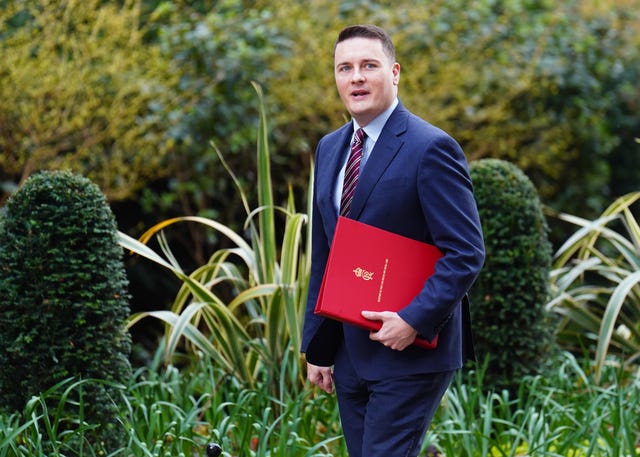Resident doctors in England to be balloted on strike action over pay
The ballot will open on May 27 and closes on July 7.

Resident doctors in England will be balloted on strike action over pay, the British Medical Association (BMA) has announced.
The union said three weeks had passed since it warned the Government of the “consequences of the absence of a reasonable, timely pay offer”.
The ballot will open on May 27 and closes on July 7.
Resident doctor is the new term for junior doctor and refers to more than 50,000 qualified doctors working in GP practices and hospitals, from graduates to medics with a decade of experience.
Co-chairs of the BMA’s resident doctors’ committee, Dr Melissa Ryan and Dr Ross Nieuwoudt, said: “Today we met with Wes Streeting and made clear that all he would have to do to avoid the need for a ballot was pledge to negotiate a fair deal that moved us toward pay restoration by 2027, in line with existing BMA policy.
“Unfortunately, he could not make this commitment.”
The BMA claims basic pay for resident doctors has fallen by 22.3% in real terms since 2008/2009.
The figure is based on Retail Prices Index (RPI) inflation, the measure of average changes in the price of goods and services used by most households.
The co-chairs added: “Resident doctors are not going to be ignored.
“We are going to stand up for our value to the NHS and to patients, and we are going to fight to stay on the path set out for us by last year’s deal: restoration of our pay to the level of 2008.
“No doctor today is worth less than they were 17 years ago, and that is precisely what doctors voting ‘yes’ to industrial action will be telling the Government.
“We don’t want to be in the situation where we have to fight over and over again for our worth – we would rather get on with our careers and our work caring for our patients.

“But our successful action over previous years shows clearly that if that is what we must do, then doctors are more than prepared to do it.
“The Government does not have to go through what its predecessor did.
“It can instead act responsibly and tell us that it will be putting us back on the path to full pay restoration.
“If they can commit to that, we never need to even see a picket line form.”
Resident doctor members of the BMA have taken industrial action 11 times since 2022.
NHS England estimates the walkouts led to almost 1.5 million appointments being cancelled or rescheduled.
The last strike took place on June 27 to July 2, just days before the general election.
In September, BMA members voted to accept a Government pay deal worth 22.3% on average over two years.
The deal included a pay rise of between 3.71% and 5.05% – averaging 4.05% – for resident doctors, on top of an existing pay award for 2023/24, which was backdated to April 2023.
Each part of the pay scale was uplifted by 6%, plus £1,000, as recommended by the Review Body on Doctors’ and Dentists’ Remuneration (DDRB), with an effective date of April 1 2024.
The Government also committed to work with the BMA to streamline how resident doctors report any additional hours they work, along with reforms to training.
Danny Mortimer, chief executive of NHS Employers, said: “The Government has taken welcome steps to accelerate pay review decision-making for annual pay awards and has acted more broadly to enhance employment and trade union rights across the economy.
“It is also developing a comprehensive plan for the NHS, its patients and people.
“At the same time, there are profound challenges for public sector finances and the economy.
“In this context, NHS organisations will be alarmed by the BMA’s preparations to ballot on the outcome of the DDRB process.
“Health leaders would urge all trade unions, including the BMA, to prioritise dialogue with the Government rather than industrial action.
“Such dialogue would absolutely need to reflect the very real concerns of NHS workers, but also to understand, in particular, the longer-term opportunities as we all work together to improve the health of the nation.”





